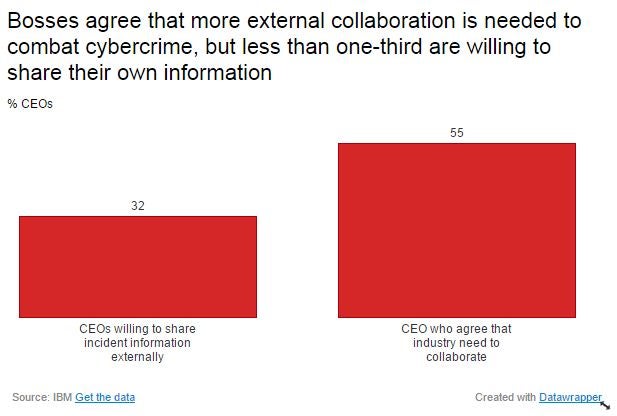Cyber attacks are increasing because bosses don’t know who the enemy is, report shows
Over 50% of bosses agree that more external collaboration is needed to combat cybercrime, but less than one-third are willing to share their own information

Your support helps us to tell the story
From reproductive rights to climate change to Big Tech, The Independent is on the ground when the story is developing. Whether it's investigating the financials of Elon Musk's pro-Trump PAC or producing our latest documentary, 'The A Word', which shines a light on the American women fighting for reproductive rights, we know how important it is to parse out the facts from the messaging.
At such a critical moment in US history, we need reporters on the ground. Your donation allows us to keep sending journalists to speak to both sides of the story.
The Independent is trusted by Americans across the entire political spectrum. And unlike many other quality news outlets, we choose not to lock Americans out of our reporting and analysis with paywalls. We believe quality journalism should be available to everyone, paid for by those who can afford it.
Your support makes all the difference.Company leaders know collaboration is necessary to combat cybercrime but are reluctant to share information, according to a new study.
Well over 50 per cent of bosses agree that more external collaboration is needed to combat cybercrime, but less than one-third are willing to share their own information externally, according to a survey by IBM, a technology and consulting corporation, which gathered answers from more than 700 top senior executives globally.
This might be because managers are not clear who the enemy is.

Some 70 per cent of those surveyed think rogue individuals make up the largest threat to their organisation.
In reality, 80 per cent of cyber-attacks are driven by highly organised crime rings in which data, tools and expertise are widely shared, according to a United Nations report cited by IBM.
“The world of cybercrime is evolving rapidly but many C-Suite executives have not updated their understanding of the threats,” said Caleb Barlow, vice president at IBM Security.
The most successful cyber-criminals are known to collaborate by sharing information on the “dark web”, in which those with bad intentions can interact anonymously.
“Cybercriminals are a lot more professional than people realise,” Martin Borrett, IBM distinguished engineer and CTO at IBM security Europe, told the Independent.
“They are clever. They are sharing these bits of malicious codes with each other, refining them and reissuing them in a very collaborative way,” he added.
Borrett said companies and cybercriminals were playing a “cat and mouse game”. He said it was important for companies to start sharing indicators of threats among companies.
Some 65 per cent of senior executives said they are very confident their cybersecurity plans are well established. Yet only 17 per cent demonstrate the highest level of preparedness and capability, according to the IBM survey.
Cyber security breaches were a regular occurrence in 2015.
"Sharing information in a responsible manner can help reduce risk and response time. As more CEOs see the benefits of collaborative defence against cyberattacks, it is likely to increase their willingness to participate in threat sharing," said Greg Davis, Managing Associate Partner for Security Business at IBM UK & Ireland told the Independent
The TalkTalk hack and Wetherspoons leak exposed a lack of expertise at UK companies and poor cyber skills in the workforce. Customers suffered most after many had their personal details exposed.
In December, Wetherspoons, the UK pub chain, said that 650,000 people might have had their personal details leaked, and that the card details of 100 people had been compromised.
Join our commenting forum
Join thought-provoking conversations, follow other Independent readers and see their replies
Comments